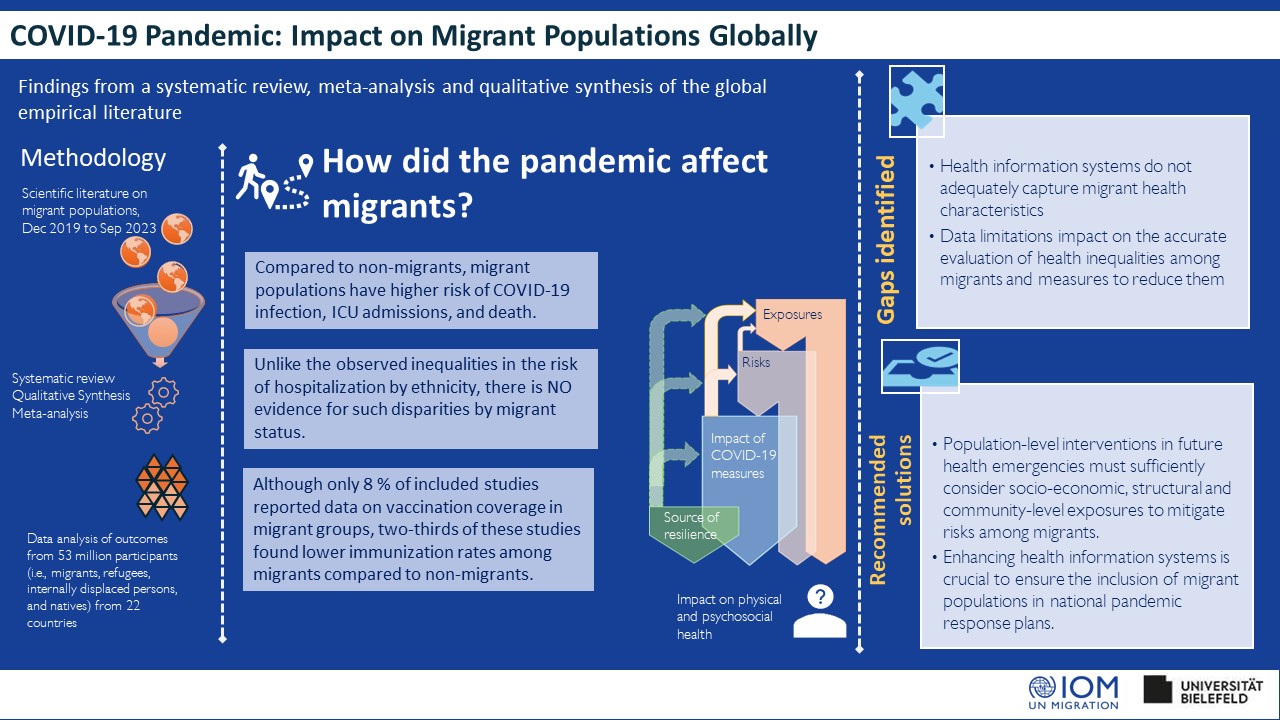-
Who We Are
WHO WE AREEstablished in September 2015, the International Organization for Migration’s Global Migration Data Analysis Centre was set up to respond to calls for better international migration data and analysis. Data are key to inform migration governance, improve programming and promote a better public understanding of migration.
About
About
IOM Global
IOM Global
-
Our Work
Our WorkData is key to inform migration governance, improve programming and promote a better public understanding of migration. GMDAC works toward this purpose through activities in knowledge management, data capacity-building and innovation, and data collection and analysis.
Areas of Work
Areas of Work
Projects
Projects
- Data and Resources
- Take Action
COVID-19 Pandemic: Impact on Global Migrant Populations
Berlin/Geneva – Refugees, internally displaced persons and migrants worldwide were exposed to significantly higher health risks during the COVID-19 pandemic than other population groups, according to a recent study by Bielefeld University, in collaboration with the International Organization for Migration (IOM) and researchers from Heidelberg University Hospital and the universities of Uppsala and Umeå. The study includes data from over 53 million people across 22 countries, including both migrants and natives.
“Migrants have been at an increased risk of contracting SARS-CoV-2 not only in the early phases but throughout the entire pandemic,’ says the principal investigator, Professor Dr Kayvan Bozorgmehr, from Bielefeld University. "While clinical deaths were lower among migrants - probably due to their younger average age - population-based mortality tended to be higher, especially in high-income countries.”
The study reveals systemic barriers such as crowded living conditions, precarious working conditions and limited access to healthcare and social security often lead to poor health outcomes observed among migrants. The study further highlights the urgent need for targeted interventions, indicating that migrants experienced an 84 per cent higher COVID-19 risk of infection and a 46 per cent higher mortality rate compared to the general population.
“Our study reveals that health information systems have significant gaps in capturing migration characteristics, which renders migrants invisible in official data,” says Maren Hintermeier, first author of the study at Bielefeld University.
The lack of health information has impeded the accurate evaluation of health inequalities among migrants, and measures to reduce them. This was particularly evident in the case of inequalities in immunization. Although only eight per cent of the included studies reported data on vaccination coverage in migrant groups, two-thirds of these studies found lower immunisation rates among migrants compared to non-migrants.
“This global study demonstrates the impact of pandemics on migrants worldwide. It also points to effective strategies to better protect public health by including migrants in regional, national and global responses. The findings and solutions presented in this report can help policy makers and programme implementers develop strategies and interventions that not only promote equity for migrants, but also lead to better health protection for the entire population. These lessons must not be forgotten in future health emergencies,” notes Dr Poonam Dhavan, the Director of Migration Health Division at IOM.
The authors concluded by stressing the urgent need for more inclusive health and social policies. They assert that national pandemic plans must adequately consider refugees, migrants, and internally displaced persons.
The analysis was published in eClinicalMedicine as part of The Lancet Discovery and the study was coordinated by the Rapid Review Response Unit (RRRUn) at the School of Public Health at Bielefeld University. This unit systematically collects and analyses evidence on health determinants and population-based interventions aimed at supporting evidence-based decisions in the healthcare system.
To download the publication, click the link here.

For more information, please contact: Andi Armia Pratiwi, Digital Communications Officer apratiwi@iom.int
